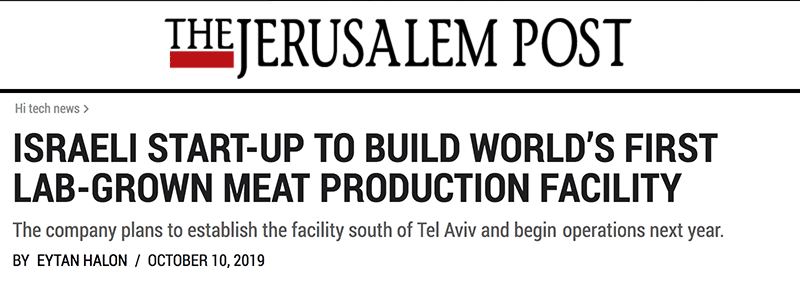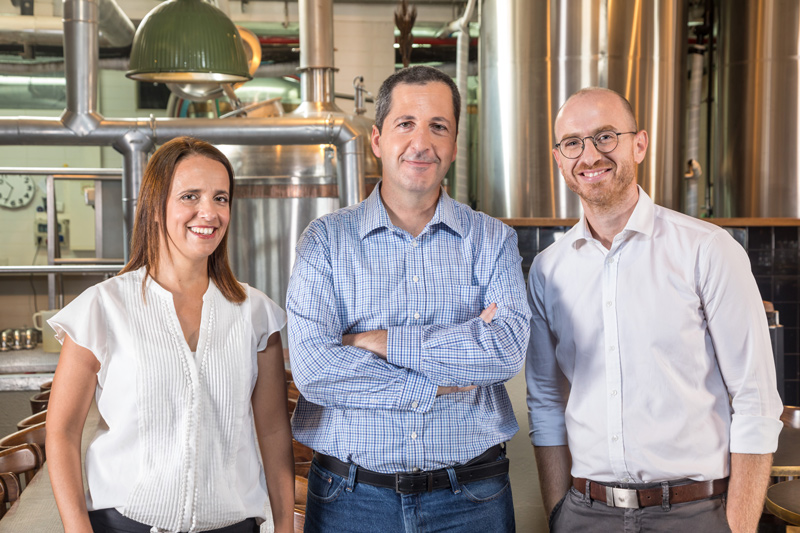

Jerusalem biotechnology company Future Meat Technologies has announced it will establish the world’s “first cultured meat pilot production facility,” producing GMO-free meat cultivated directly from animal cells on a commercial scale.
The company plans to establish the facility south of Tel Aviv and begin operations next year. The expansion of research and development efforts come after the start-up secured $14 million in a Series A funding round.
Based on technology developed by Prof. Yaakov Nahmias of the Hebrew University of Jerusalem, Future Meat Technologies utilizes the rapid growth of connective animal tissue cells (fibroblasts), without the need to raise or harvest animals. Grown in patented bioreactors, the cells can be turned into cultured muscle and healthy fats.
The company’s manufacturing process, during which cells double in mass every 24 hours, enables the production of cell-grown chicken, lamb and beef within only two weeks.
The funding was led by Chicago-based venture capital firm S2G Ventures, a leading backer of successful meat substitute developer Beyond Meat, and Swiss venture capital firm Emerald Technology Ventures.
They were joined by investors Henry Soesanto, the CEO of Philippine-based food manufacturer Monde Nissin; UK-based venture capital firm Manta Ray Ventures; and Chinese food and agriculture technology venture capitalist firm Bits x Bites.
“With this investment, we’re thrilled to bring cultured meat from the lab to the factory floor and begin working with our industrial partners to bring our product to market,” said Future Meat Technologies CEO Rom Kshuk. “We’re not only developing a global network of investors and advisers with expertise across the meat and ingredient supply chains, but also providing the company with sufficient runway to achieve commercially viable production costs within the next two years.”
The company says its laboratory-based manufacturing model results in 99% less land use and 80% fewer greenhouse emissions that traditionally produced meat. The company plans to introduce hybrid products into the market, combining plant proteins for texture with cultured fats to create the aroma and flavor of meat.

While existing small-scale production costs $150 per pound of chicken and $200 per pound of beef, Future Meat Technologies aims to market its hybrid products at a “competitive cost level” from its pilot production facility by 2021.
The company forecasts a second line of entirely cultured meat products costing less than $10 per pound by 2022.
“I personally want to make sure my children and grandchildren will be able to enjoy the same meat dishes that I grew up with,” said Nahmias, who serves as the company’s chief scientist. “The worldwide demand for protein is growing exponentially, and the only way to meet this demand is by fundamentally reinventing animal agriculture. Future Meat Technologies created a cost-effective solution for cultured meat manufacturing that is scalable and sustainable by design.”

According to a report published in September by nonprofit Start-Up Nation Central, more than 350 hi-tech firms operate in the agri-food field in Israel – with approximately one-third established during the past five years.
The report detailed that Israel, well-known for its “first wave” of agricultural innovation including drip irrigation and the development of cherry tomatoes, is currently enjoying a “second wave” of innovation based on big data analysis, sensors, biotech and robotics.
Innovative solutions often focus on smart yield management, pathogen control and alternative food sources – notably for animal protein and sugar consumption.